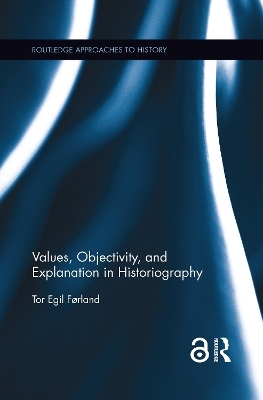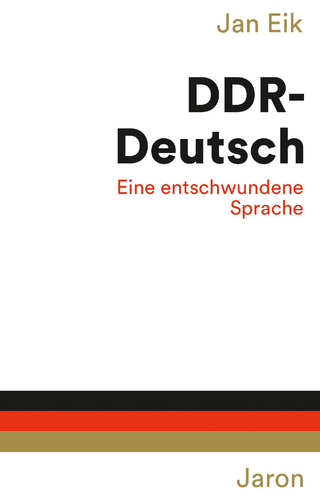
Values, Objectivity, and Explanation in Historiography
Seiten
2019
Routledge (Verlag)
978-0-367-34448-1 (ISBN)
Routledge (Verlag)
978-0-367-34448-1 (ISBN)
This book explores the issues of explanation and narration in historiography, arguing that history is not just interpretation, and that the interpretive part, important though it is, is far from wholly subjective or hostage to the historian's values.
Bringing sophisticated philosophy to bear on real-life historiography, Values, Objectivity, and Explanation in Historiography rekindles and invigorates the debate on two perennials in the theory and methodology of history. One is the tension between historians' values and the ideal—or illusion—of objective historiography. The other is historical explanation.
The point of departure for the treatment of values and objectivity is an exceptionally heated debate on Cold War historiography in Denmark, involving not only historians but also the political parties, the national newspapers, and the courts. The in-depth analysis that follows concludes that historians can produce accounts that deserve the label "objective," even though their descriptions are tinged by ineluctable epistemic instability. A separate chapter dissects the postmodern notion of situated truths.
The second part of the book proffers a new take on historical explanation. It is based on the notion of the ideal explanatory text, which allows for not only causal—including intentional—but also nomological, structural, and functional explanations. The approach, which can accommodate narrative explanations driven by causal plots, is ecumenical but not all-encompassing. Emergent social properties and supernatural entities are excluded from the ideal explanatory text, making scientific historiography methodologically individualistic—albeit with room for explanations at higher levels when pragmatically justified—and atheist.
Bringing sophisticated philosophy to bear on real-life historiography, Values, Objectivity, and Explanation in Historiography rekindles and invigorates the debate on two perennials in the theory and methodology of history. One is the tension between historians' values and the ideal—or illusion—of objective historiography. The other is historical explanation.
The point of departure for the treatment of values and objectivity is an exceptionally heated debate on Cold War historiography in Denmark, involving not only historians but also the political parties, the national newspapers, and the courts. The in-depth analysis that follows concludes that historians can produce accounts that deserve the label "objective," even though their descriptions are tinged by ineluctable epistemic instability. A separate chapter dissects the postmodern notion of situated truths.
The second part of the book proffers a new take on historical explanation. It is based on the notion of the ideal explanatory text, which allows for not only causal—including intentional—but also nomological, structural, and functional explanations. The approach, which can accommodate narrative explanations driven by causal plots, is ecumenical but not all-encompassing. Emergent social properties and supernatural entities are excluded from the ideal explanatory text, making scientific historiography methodologically individualistic—albeit with room for explanations at higher levels when pragmatically justified—and atheist.
Tor Egil Førland is professor of contemporary history and head of the Department of Archaeology, Conservation and History at the University of Oslo.
Introduction
Part I: Objectivity, Values, and Theory Choice
1. Participants and Fellow Travelers: The Left, the Soviet Union, and the Fall of Objectivism
2. Court Historian: Matters of Fact
3. Witches Cannot Fly: A Critique of the Notion of Situated Truths
4. In Defense of Objectivity: Facts and Theory Choice in Historiography
Part II: Explanation and Causality
5. The Ideal Explanatory Text in History: A Plea for Ecumenism
6. Mentality as a Social Emergent: Can the Zeitgeist Have Explanatory Power?
7. Acts of God?: Miracles and Scientific Explanation
8. Problems of Causation in Historiography
| Erscheinungsdatum | 29.05.2019 |
|---|---|
| Reihe/Serie | Routledge Approaches to History |
| Verlagsort | London |
| Sprache | englisch |
| Maße | 152 x 229 mm |
| Gewicht | 453 g |
| Themenwelt | Geisteswissenschaften ► Geschichte |
| ISBN-10 | 0-367-34448-3 / 0367344483 |
| ISBN-13 | 978-0-367-34448-1 / 9780367344481 |
| Zustand | Neuware |
| Haben Sie eine Frage zum Produkt? |
Mehr entdecken
aus dem Bereich
aus dem Bereich
eine kleine Soziologie des Heavy Metal
Buch | Softcover (2023)
Kohlhammer (Verlag)
CHF 29,90
Projekte, Visionen, Luftschlösser
Buch | Hardcover (2023)
Lehmstedt Verlag
CHF 41,95


